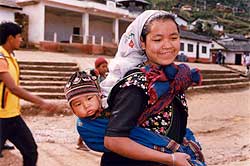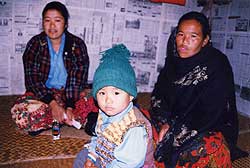At night, the rugged mountains surrounding Jumla reverberated with the sound of gunfire. The firefight went on for several hours as a paramilitary unit was ambushed by guerrillas in what turned out to be one of the last battles before the ceasefire was announced three days later. It snowed all night and the fighting tapered off. The next morning, there were several inches of snow on the ruins of Jumla bazar, devastated in the deadly Maoist attack of 14 November in which more than 130 people were killed.
The town was tense as we flew out of Jumla's partially-destroyed airport. When we got to Surkhet that night, we heard that a ceasefire had been announced. Next stop was Pyuthan, and had the ceasefire not intervened, the Maoists were reportedly preparing to attack Pyuthan the night we arrived.
With the truce, the atmosphere everywhere is more relaxed and we met the district administration, the security forces, and women detainees in jails (see pictures, above). The Maoist detainees were scathingly critical of any peace brokered in Kathmandu. The dialogue for peace should begin in the districts that have been most affected, was their viewpoint. In other words, walk the talk.
With this message in mind, I carried on the next day to Rolpa, the district where the "peoples' war" had been launched exactly seven years ago this week. I was travelling with two young journalists and an even younger driver who was from Rolpa but hadn't been up there for a while. As the jeep bounced wildly on the rough road in the darkness of this cold Rolpa night, I recalled the first news in 1996 of black-hooded attackers. The government paid little heed, perhaps because it still perceived the Maoist party-which had the third largest showing in the 1991 general election-to be still in the mainstream. What might have escaped the kangresi leaders' memory then was the way they had also launched their underground armed struggle against the Panchayat system in 1968.
The Jhapali Marxist-Leninists also mounted an insurrection then, so this was not the first time there was an armed uprising in the country. After 1996, the conflict spread like wildfire, engulfing the whole country. But I wonder if the politicians in Kathmandu ever really woke up. The old games of business-as-usual, corruption and narrow-sighted patronage in all their forms, continued as the war raged. Nearly 8,000 Nepalis have been killed, many thousands more were maimed physically, materially, and mentally.
But perhaps it took the killings of Krishna Mohan Shrestha, his wife, and bodyguard to wake up the leaders in Kathmandu. Finally, the revolution was getting close enough to matter.
We lurched along the Bhalubang-Libang road at about 9 km/hr. All around were 3,000 m peaks. The district is rugged and with a population of only 210,000-with seven thousand more women than men because of out-migration. Rolpa also has the highest proportion of the population who are gun-carrying Maoists. And 40 percent of the militia are female. Most are Magars, with Kamis and other Dalits. It is easy to see why the war started here. It might not be one of the remotest districts, but it sure is underdeveloped with one of the worst human development parameters in Nepal and an entrenched feudalism.
Night fell, a dim light was glowing on a far hilltop. In the ghostly darkness we passed ruins of bombed-out, deserted, or padlocked buildings. This was a war zone. It was way after curfew, and driving here was risky business even with the ceasefire. The tiny glow was from a house where a woman and a child stared out at us. "Weren't you stopped?" she asked. Would she give us baas for the night, and some gundruk and bhat? The husband grunted from inside: "Dekchha, they'll see us." He prepared food, we ate hurriedly and were moved up to the attic to sleep with another warning not to go anywhere.
The military came at 7am to check who had arrived in the jeep.
Technically, we were illegal arrivals since we had come after 6.30pm without having actually registered at the checkpoint. It took another hour to reach Libang. The district headquarter was surrounded by barbed wire and looked like the fortified garrison town that it is. Tin cans and bottles were hanging from the barbed wires to serve as early warning, and the slopes were said to be mined. Beyond the wires was "them".
We met them soon enough, and talking to the women could sense their empowerment. They are convinced that proletarian rule will soon come, and they complained bitterly: "What did multi-party democracy do for us? The leaders were worse than the panchas."
Rolpa's single hospital was under construction, but now lies abandoned. There are hardly any government services. This is a district that has been left to fend for itself the best it can.
A Maoist woman prisoner told us why she joined the movement: "We had been left here alone to die. Most of us have no farmland. No roads. No businesses. Nothing." Another added, "It was waar ki paar."
I asked, aren't you tired of the fighting? Answer: "Not really."
Without exception, prisoners felt they were there for a just cause, as though it was just a question of days until their cause would be won. Those outside jail expressed pride at having Rolpa almost totally under their control. "Yes, we are happy about the ceasefire and the talks," said one.
That view is even shared by the deputy-superintendent of police in Libang. "I wish I could arrest anyone I hear talking negatively about the ceasefire," he says. Rolpa after the ceasefire is a happier place. Outside the jail house I asked a woman with a baby what she thought about the ceasefire. "Ramro bhayo," she answered. What about the security forces? Very happy, too, they posed for a photograph.
The Rolpali say they want to come to Kathmandu for a mass rally and cultural performances. You have to hand it to the Maoists for being so many steps ahead of the rest of us: they want to "attack" Kathmandu not with guns but with musical instruments. Maybe they should add ploughshares, too, so that the message comes across: the giving must start from Kathmandu.

Bimala Gharti smiles for the camera in the yard of Libang jail. She and her husband are both militia members.

Six years after being arrested for being a Maoist, Bhujimala Pun is still serving a jail sentence in a cell covered with newspapers.
(Durga Pokhrel is the chairperson of the National Commision for Women.)


